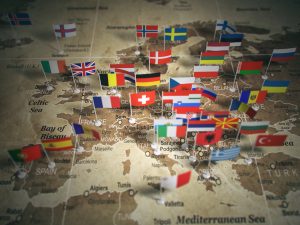Although the left-wing coalition of the New Popular Front won the early legislative elections in France this Sunday, the far-right, through the National Rally, nonetheless achieved the most significant breakthrough in its history. The shockwave that followed the European elections on June 9th continues to affect the political world across the old continent.
The conclusion seems clear within the 27 countries of the European Union: the far-right was the big winner of this vote. Far-right parties also won the European elections in Italy, Austria, Hungary and Belgium. How did Europe slide towards this extreme? A number of research projects at the University of Luxembourg shed light on this question, and attempt to provide answers to better understand the ongoing redrawing of the political map.
In 2019, as the health crisis caused by the emergence of COVID-19 erupted, researchers began to ask how the pandemic might affect society, the economy, politics and mental health. Josip Glaurdić and Christophe Lesschaeve were working on electoral behaviour and political competition over the past three decades in the Balkan countries. Then pandemic intervened, and new questions arose: “The region we were interested in was one of the hardest hit by Covid-19. Southeast Europe had the darkest figures regarding coronavirus-related mortality. We thought the problem was political and sought to understand the phenomenon by focusing on nationalism and populism, the two ideologies that currently dominate the political landscape in almost all of Europe. We, therefore, measured individuals’ adherence to these ideological visions to understand how much it was or wasn’t a determining factor in predicting belief in conspiracy theories, trust in science, vaccination…”, explains Glaurdić. The researchers’ findings are unequivocal: “Nationalism and populism prevail over all other explanations of individuals’ behaviour and beliefs related to the pandemic, even education.” He adds: “Managing a pandemic is just one aspect of contemporary society; there are also economic inequality, migration… the extent of nationalist and populist divides in those areas as well is simply astounding. The polarisation of society is insane.”
Economy, insecurity and identity withdrawal
European society has evolved, and its concerns, once economic, are now increasingly identity-based. “There has been a shift towards more cultural issues over the past few decades. Immigration has become the focal point of a new narrative. Cultural identity in society influences voting preferences more today than economic interest”, notes Christophe Lesschaeve.
The recent success of Conservative political parties is also at the heart of a number of projects led by Conchita d’Ambrosio, together with Anthony Lepinteur and other members of her research team. In particular, she has examined the impact of individual economic insecurity on voting choices. “We have demonstrated how much economic insecurity encourages political activism, but of a certain type: support for more conservative and right-wing parties”, she explains before adding: “It seems that since the 2000s, economic insecurity matters more in predicting political preferences than in the past.”
This growing sense of global insecurity fueled by worries about unemployment, digitalization, artificial intelligence, pandemics, armed conflicts, and the ecological crisis is reflected in a new PhD programme at the University of Luxembourg, co-funded by the FNR. “Economic Insecurity: Causes, Consequences, and Actions (EICCA)” will fund 14 PhD positions across the Social Sciences, in partnership with LISER, and aims to provide new ways of measuring economic insecurity understand its origins and impact, and evaluate the political responses.
From filtered discourses to filter bubble
Far-right parties benefit from another evolution, that of the media. The speeches of opinion leaders, once analysed by professionals, are now broadcast without contextualisation or verification on social networks. “The diversity of information is replaced by a personalised algorithm. This does not promote the construction of a reasoned opinion but rather the creation of filter bubbles within which users’ beliefs are predominantly reproduced, reinforcing unique opinions”, describes Raphael Kies, involved in the Mediareform.lu study, which seeks to reassess the electronic media law in Luxembourg. Far-right political parties have well understood the interest of these platforms and “have become communication pros in a few generations. They master the codes and have managed to make themselves more presentable, even convincing their political opponents to ally with them”, adds Christophe Lesschaeve.
An agora for democracy
Through their work, researchers at the University of Luxembourg reveal how much the current political situation in Europe is a complex and multifaceted phenomenon. The University, as an agora, a place of exchange and education, makes perfect sense here. That is why for example, “we try to help Luxembourg citizens to inform themselves and understand political issues through the ‘smartwielen‘ application,” says Kies. “Democracy is an eternal consensus that requires constant conversation and deliberation. It is not limited to one election to the other. This is the added value of a University. Without it, society would be much weaker. Debating and informing is part of our mission“, insists Josip Glaurdić.
You may also like
-

POLINDEX – Political Observatory
POLINDEX aims to provide an annual, non-partisan, and scientific account of potential transformations in the individual and collective values (and their consequences in terms of social cohesion and political legitimacy) of Luxembourgish citizens and foreign residents in the Grand Duchy of Luxembourg.
-

ELWar – Electoral Legacies of War
ELWar aims to fill the gap in our understanding of electoral legacies of war by analyzing the evolution of political competition over the course of more than two decades in the six postwar states of Southeast Europe: Bosnia-Herzegovina, Croatia, Kosovo, Macedonia, Montenegro, and Serbia.
-

Economic insecurity and political preferences
Economic insecurity has attracted growing attention, but there is no consensus as to its definition. We characterize a class of individual economic-insecurity measures
based on the time profile of economic resources. We apply this economic-insecurity measure to political-preference data in the USA, UK, and Germany.
